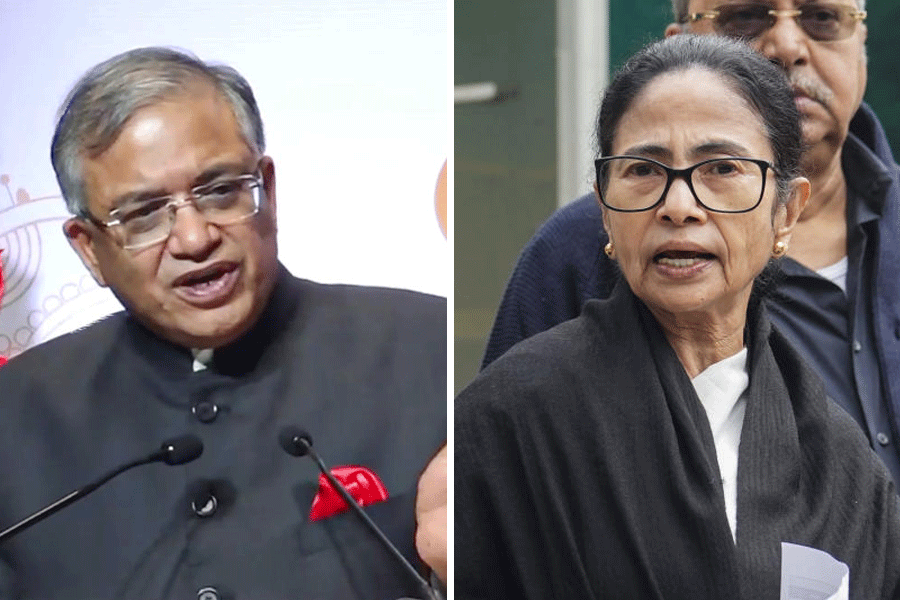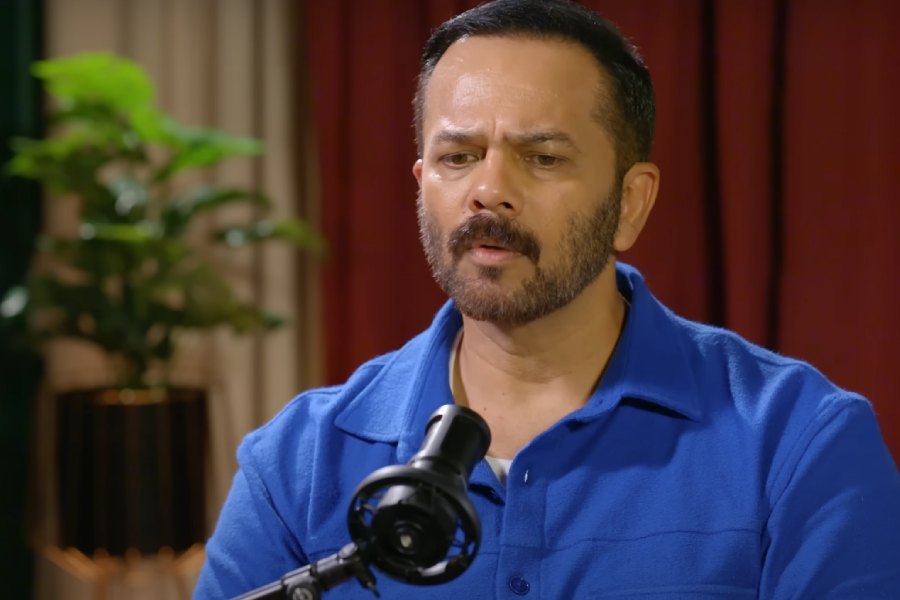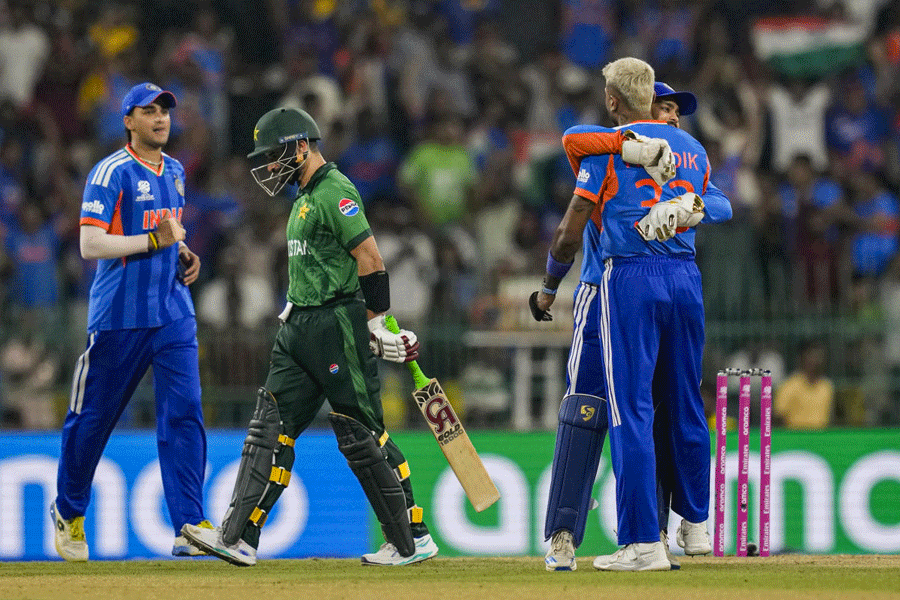 |
| Parvati (Shriya Saran) and Saleem Sinai (Satya Bhabha) |
Midnight’s Children deserves a big outing in India. The movie, screened at the London Film Festival, has many excellent performances but if there are a couple that threaten to steal the show, they are Rahul Bose as Gen. Zulfi and Anita Majumdar as his wife, Emerald.
In the West, there have been a few reviews that are a trifle lukewarm but they are to be ignored for far too often reviewers have allowed their personal hostility to Rushdie, the person, to colour their assessment of the film.
Also, the film is almost a private dialogue between Deepa Mehta and Salman Rushdie, the director and screenplay writer, respectively, and Indians across the world.
When Mumtaz (who is to be Saleem Sinai’s mother) is falling in love with Nadir Khan, she tells him the food she has prepared for him is getting cold.
“Eat, nah?” Mumtaz urges Nadir, who is to be her first husband.
Foreigners may be puzzled by this exchange but Indians will understand the emotion conveyed in Mumtaz’s words.
There is an amusing exchange between Dr Aadam Aziz and his wife, Naseem Ghani, on their wedding night. She had been his patient, first spotted through the perforated sheet (he was done for after he had a good feel of her breast).
On their marital bed, he would like his bride to be, well, a bit more responsive.
 |
| Emerald (Anita Majumdar) and Zulfi (Rahul Bose) |
When he encourages Naseem to “move, like a woman”, she retorts angrily that he must have met foreign women with dubious ways when he was abroad training to be a doctor: “Listen Dr Saab, husband or no husband, I’m not the moving type....”
To really savour the film, adapted from arguably the most important novel to come out of India since Independence, it repays re-reading — or reading since three decades have passed since its publication in 1981 — the start to Midnight’s Children (winner of the Booker and, twice, the Booker of Bookers).
The protagonist is Saleem Sinai: “I was born in the city of Bombay... once upon a time. No, that won’t do, there’s no getting away from the date: I was born in Doctor Narlikar’s Nursing Home on August 15th, 1947. And the time? The time matters, too. Well then: at night. No, it’s important to be more.... On the stroke of midnight, as a matter of fact. Clock-hands joined palms in respectful greeting as I came. Oh, spell it out, spell it out: at the precise instant of India’s arrival at Independence, I tumbled forth into the world.... I had been mysteriously handcuffed to history, my destinies indissolubly chained to those of my country.”
This is the story of modern India movingly told.
At its core is the tale of two babies, born at the midnight hour as India achieves freedom, but immediately swapped by the nurse Mary Pereira (Seema Biswas) so that the poor baby, Saleem Sinai (Darsheel Safary/Satya Bhabha), goes to the rich parents, Ahmed (Ronit Roy) and Amina Sinai (Shahana Goswami), and the rich baby, Shiva (Siddharth Narayan), is given to the poor singing father, Wee Willie Winkie (Samrat Chakrabarti), whose wife has died in childbirth.
It is understood that Deepa and Rushdie worked harmoniously together — and this is apparent. After Fire, Earth and Water, Deepa’s track record is well established but with Midnight’s Children she has risen to the challenge and new heights.
Deepa has been able to get remarkable performances, among them Anupam Kher as Ghani; Rajat Kapoor as Aadam Aziz; Shabana Azmi as his wife, Naseem; Seema as Mary (hard to think this was the actress who portrayed Phoolan Devi in Shekhar Kapoor’s Bandit Queen); Ronit Roy as Ahmed Sinai (Ronit was also the hard father in Udaan); and Shahana Goswami as Amina.
Also worth applauding is Charles Dance (of The Jewel in the Crown fame on British television) as William Methwold (who is Saleem’s biological father), the only English character in the movie.
 |
| Salman Rushdie with Deepa Mehta; (right) Siddharth Narayan as Shiva in Midnight’s Children |
Usually, it is not a good idea for an author to write a screenplay from his own novel but this must be an exception. No one could have done it better. Rushdie’s voice is heard loud and clear — literally, in the sense that Deepa persuaded the reluctant writer to do the voiceover.
And he has done it well. After all, at Cambridge, Rushdie fancied himself as something of an actor. However, there is no Alfred Hitchcock moment in Midnight’s Children — no fleeting glimpse of Rushdie, say, in a bazaar scene.
It was a huge task, making a two-hour, 10-minute film from a novel with more than 600 pages, scores of major characters and dealing with the period from India’s Independence in 1947 to 1978, the year after the end of the Emergency and Indira Gandhi’s electoral defeat.
It is with the portrayal of the Emergency that the film has a problem. Many viewers probably will have reservations about the way Mrs Gandhi’s state of Emergency has been treated in Midnight’s Children.
There is no doubt that Indian democracy was derailed in 1975 when thousands of Mrs Gandhi’s political opponents were locked up across the country, the press was muzzled, slums bulldozed in the name of progress and her son, Sanjay Gandhi, given the power to launch a terror campaign of forced sterilisation.
A shrewish woman, clearly a caricature of Mrs Gandhi, makes a speech in a very harsh voice: “The Emergency was necessary — and justified. Democracy was under threat. It had to be protected.”
It’s just that the way the period 1975-77 has been dealt with cinematically somehow does not fit in with most of the rest of the film, which is simply superb — Indian cinema at its best.
The film was shot in Colombo but there are scenes, recorded by the second unit, on the Dal Lake in Kashmir, in Agra with the Taj Mahal in the background, and near the Jama Masjid in Delhi.
One cannot write too highly about Rahul Bose who first appears as Zulfi, a dapper military man in the house of Dr Aadam Aziz in pursuit of Nadir Khan. Here, he meets Emerald (Anita Majumdar), the prettiest of Aziz’s three daughters.
“Did you see that girl, captain?” Zulfi addresses his flunky.
“Yes, sir!”
“That, captain, is the girl I intend to marry,” he declares.
Flunky: “Yes, sir!”
Mumtaz’s marriage to Nadir remains unconsummated and he flees his hiding place in Dr Aziz’s basement, just before the military men return to look for him. Mumtaz takes Ahmed Sinai, a well-to-do businessman, as her second husband.
On the train to Bombay, her husband gives her a new name: “Nadir and Mumtaz are in the past... better to leave them behind, no? A new name for a new beginning... Mrs Amina Sinai.”
For a complicated story, twisting and turning through generations and moving from Kashmir to Agra to Bombay to Karachi, it is easy to follow the plot up to the crucial moment: the birth of Saleem and Shiva at the stroke of the midnight hour followed by the baby swap — a pure Bollywood moment.
Rarely has Nehru’s “tryst with destiny” speech been used as well as in Midnight’s Children, where it is inter-cut brilliantly with exploding firecrackers lighting up the night sky, the strains of Jana Gana Mana and two births and a death in Dr Narlikar’s Nursing Home.
Rushdie’s voiceover is heard: “At the precise instant of India’s arrival at Independence, on the stroke of midnight as a matter of fact, I tumbled forth into the world....”
Later, a blood test would reveal that Saleem is not the biological child of Ahmed and Amina and he is packed off from Bombay to Karachi to live with “Uncle Zulfi” and “Aunt Emerald” — only, he is obliged to address his uncle, who is planning a coup, as “General, Sir!”
“Your cousin, Zia, will show you the ropes,” his aunt says.
Zia: “What did you do to get kicked out?”
Saleem: “I hear you still wet your pants.”
It is in Karachi that Saleem grows up and finds himself pitchforked eventually into the Bangladesh war of 1971. He witnesses Gen. Zulfi surrender his sword to his friend, “Sonny” (Gen. Arora of India).
There is a very entertaining exchange between Zulfi and Sonny, who merely blesses the sword with a genial: “Good, that’s that.... I am sorry for your losses in the battle, Zulfi.”
Zulfi: “Thank you, sir.”
Sonny pushes forward “our most decorated officer -– he fought quite a battle!”
Zulfi: “Good show, major.”
Wearing dark glasses and hair slicked down as the archetypal Bollywood villain, the young officer is none other than Shiva.
Voiceover by Rushdie: “When Gen. Zulfikar surrendered to his old friend, Gen. Arora of India, Pakistan also lost more than half its population who became citizens of Bangladesh.... In those days all our wars were fights between friends.”
During the celebrations in Bangladesh, Saleem again meets Parvati, the magician and one of 1,001 midnight’s children, and is spirited into India in her apparently empty basket.
Voiceover from Saleem (Rushdie): “And so it came to pass that without passport or permit I returned in Parvati’s basket of invisibility to India — my India — the land of my birth.”
The use of the expression “my India” hints at where Rushdie’s sentiments still lie.
Saleem’s happiness with Parvati is short-lived. She dies during the Emergency, leaving behind a baby fathered by Shiva, who orders Saleem to be sterilised and locked up. As the Emergency ends, Shiva dies in a motorcycle accident. The baby, named Aadam, is brought up as his own son by Saleem, who catches up with his old ayah, Mary, now making green chutney for Braganza Pickles (Private) Ltd in Bombay.
Voiceover: “The Emergency everybody called it but it was really a betrayal — her betrayal of the father’s dreams. Who were we? We were the promises of Indians and, like all promises, made to be broken....”
The film ends on a note that is not entirely pessimistic: “A child and a country born at midnight... once upon a time... great things were expected of us both….”
The truth was less glorious, Saleem/Rushdie concedes in the voiceover, “but we survived and made our way and our lives have been, in spite of everything, acts of love”.
After Midnight’s Children, it could be said that Deepa Mehta and Salman Rushdie are now “handcuffed” to greatness.
Midnight’s Children, the movie, is scheduled to be released in India in December










